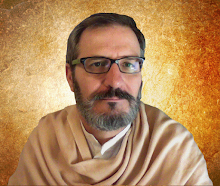According to Pascal, the search for the happiness is the motivation of all the acts of the human being. For Kant the happiness would come if it were possible for us to satisfy constantly all our desires.
" For some, as Spinoza, Montaigne, Diderot, this state of total satisfaction is possible and for Epicurus it is even easy to reach. For others, as Jean-Jacques Rousseau it is difficult to reach. For Pascal and Schopenhauer it is impossible to reach " [Wikipedia].
"The sun does like the
Light, the wind in the leafs does like the Music
and the happiness being alive speaks to us about the Holy-Name"
[Bhaktimarga 1-2-9]
and the happiness being alive speaks to us about the Holy-Name"
[Bhaktimarga 1-2-9]
This
notion of happiness becomes important, in Europe, at about the
eighteenth century and a political purpose and "societal"
with the French Revolution which puts its quest as first article of
its constitution of 1793: " the purpose of the society is the
common happiness ".
Then people make their own recipes of the happiness. Some will have materialistic aims, for other these aims will be sentimental, even spiritual and for others the notion of happiness does not even touch their spirits; they look for only one thing: surviving, drinking, eating and not being killed by a stray bullet or an explosion. It is necessary to recognize that those are still a majority in this world.
The search
for the happiness is still a spoilt children's quest.
We became
demanding
and the
entry in the happiness becomes, for us, a right.
But as we
have all our idea about the happiness
it is
difficult, for our societies, to institutionalize it,
to organize
its quest.
For the materialists the happiness will be easy to find with the abundance of money and, in this case, the percentage of people susceptible to find it will be tiny; more or less one percent. Thus the happiness would be possible only for this tiny percentage of the humanity?
If this notion of the happiness was the good one, the life would be still by too unfair, no? Then it must be false. The money doesn’t bring the happiness, at the most the well-being, which is not too bad, all the same.
For
those who count not only on tangible assets, happiness would come
from the given and received love, from the accomplished expression of
its creativity, the spirituality , thus of God.
Before talking about something we have to know the definition. After some searches on the web the definition of wikipedia was chosen because of its simplicity and its synthesis, susceptible to collect the unanimous approval:
"The
happiness is a sustainable state of plenitude and satisfaction,
pleasant and well-balanced state of the spirit and the body,
where
from the suffering, the stress, the concern and the disorder are
absent."
It is a state which sticks perfectly on this definition, this state bears various names according to the country and the time. This state is the perfect Consciousness of the bliss [Satçitananda].
So many different notions, some have nothing to do with tangible assets others put the possession forth however one must agree that it is not possible to hope for the happiness with an empty stomach. Some prerequisites are to be gathered before hoping for the bliss.
The fundamental needs of the human being must be satisfied. He must be able to feed, drink, find accommodation, live in peace and enjoy a satisfactory health ... then, if he doesn’t eat in some porcelaine de Limoges, with cutlery from Christofle and glasses of Baccarat, in the dining room of a villa the Mediterranean coast, it doesn't matter !
A
well made society should assure at least the satisfaction of these
fundamental needs. In India, in the ashram, it is usual to offer to
eat and to drink before Satsang because we don’t speak about God to
an empty stomach.
This assured prerequisite, how to know this state of happiness, Bliss? It is the existing subject of the numerous mystics and the yoga. There is a secret. There is a so simple secret that when we reveal it, it doesn’t hang on the ear of the inadvertent researcher.
Why does this secret not hang on the ear? Because it is simple and the fact that it is true doesn’t matter: when something is simple we don’t pay attention to it. The quest of the happiness, the Truth, is so essential and vital that, for complicated people, the answer cannot be simple.
Here we are, it
is written, revealed: "the
happiness is in the present moment".
Really! It is not a rhetorical figure that would tend to underline
that the regrets and the dreams of future are vain.
Our modern companies make that you have less and less the spirit in the present moment. You know well that they don’t foster the Peace of mind. Put more spirituality, not necessarily a religion, in your existence. If you wish to know the original yoga, the madhyama-marga, its techniques, make a request en the page of contact.






